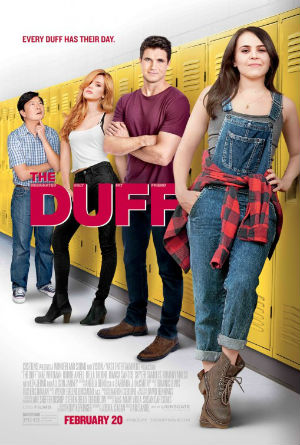I would not label myself as a movie buff; sure, I enjoy good films, can appreciate well-made cinematography, and will catch up on new movies with friends when I have time. Going to a movie theater and paying for a $12 movie ticket is not my idea of an enjoyable time but recently, I drove down to my local theater to watch “The DUFF.” I did this because this movie had piqued my interest; I was curious and wondered what kind of new “hip” and “relatable” teenage movie was now being added to the high school rom-com genre.
When I first saw the trailer for “The DUFF,” it set off a few questions in my mind. The first one was the title of the film, “D.U.F.F.,” which stands for “designated ugly fat friend.” According to the stereotypical white muscular jock “dreamy” teenage boy Wesley Rush (played by Robbie Amell), the “DUFF” did not actually have to be fat or ugly to fit the bill, but instead just be the least desirable or attractive person in their friend group by default. The main character, Bianca Piper (played by Mae Whitman), was neither of those things, and to me, seemed conventionally attractive. The fact that the title of the “DUFF” was going to someone like Bianca was a little weird to me, and made me wonder — if someone like her is considered the “DUFF,” then what does that mean for every person who isn’t runway-ready gorgeous? Are they all, by default, “DUFFs” too?
The trailer also lets the viewer know that in the movie, Bianca would enlist the help of Wesley to “un-DUFF” herself and shed that label. I could feel myself getting a headache from just thinking about the overplayed, cliche teenage movie trope the trailer had glimpses of, where a makeover becomes the most life-changing aspect. My initial idea of the movie was that “The DUFF” would be a modern day “She’s All That” rip-off, with a cheesier romance plotline, a Regina-esqe antagonist straight from “Mean Girls” and Urban Dictionary lingo.
With these fully-formed ideas already in mind, I headed down to my local theater, handed over $12 that I sorely miss, and sat myself in the back row with two other preteen girls, the only people in the whole theater to keep me company for the next hour and 41 minutes.
In short, the movie was about Bianca finding out she was a “DUFF” after Wesley told her and then going through a series of challenges and changes to try to “un-DUFF” herself, with the assistance of Wesley along the way — exactly what I expected from the trailer. But while the trailer did give me an idea of what the movie was to be about, there were some parts I was pleasantly surprised by.
The friendship-to-eventual-romance trope between the unpopular Bianca and popular Wesley was a predictable plot line that I could see about a mile away. While I could do without the “girl goes through self-change and ends up with a romantic interest as an end-goal” part of the movie, along with the cheesiness and cringe-worthy graphics, the overarching ending theme saved the film from becoming another forgettable high school movie.
Throughout the film, Bianca does go through some external changes, like dramatically unfollowing her friends on all social media sites and trying on new clothes. At the end of the film, though, it becomes apparent that the main change Bianca made was an internal one, one that allowed her to reject what others labeled her as and realized that she can be whoever she wants to be because she’s confident enough. “Yeah, I’m somebody’s DUFF, but… so is everybody. It shouldn’t affect how you see yourself,” Bianca says at the climax of the film at the homecoming dance. But that is where the catch comes in — the moral of the movie was about people being able to reject hurtful phrases and labels like “DUFF” with self-confidence and assuredness, but if people don’t watch the film and just get exposed to the catchy “DUFF” phrase, then is the movie essentially doing more harm than good?
Ultimately, the amount of people that will actually see the film is not nearly as close to the amount of people that will end up just seeing the trailer or the title “The DUFF.” While the movie ended with the positive message that people have the power to not let words define and influence them, that message can be lost due to the fact that overall, most people will just know the phrase “DUFF” and not the positive messages about that word from the movie. Like many film predecessors that have been remembered incorrectly, the word “DUFF” and the meaning behind it will most likely outlive the movie itself.


